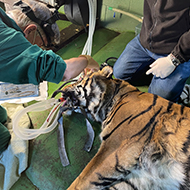
17-year-old Ratna given hood graft to treat ulcerated eye.
Veterinary surgeons have saved a tiger's eye in what is believed to be the first operation of its kind performed on a big cat.
Sumatran tiger Ratna, who lives at Shepreth Wildlife Park, had previously undergone surgery in 2019 to remove a cataract and was being given eye drops daily. In February, while performing this task, keepers noticed that Ratna's left eye was discoloured and contacted veterinary eye specialist Steve Philp from the International Zoo Veterinary Group.
The 17-year-old tiger underwent a minor procedure under anaesthetic to treat her eye, but this was unfortunately ineffective and Ratna's eye continued to deteriorate.
Specialist Dr David Williams from Cambridge University Vet School was contacted to examine Ratna and the very next day carried out what is believed to be the world's first hood graft procedure on a big cat, assisted by Dr Philp.
The procedure took just 30 minutes, with surgeons securing a flap of conjunctiva over the cornea, in order to let it heal itself. The team at Shepreth were concerned about an older cat being anaesthetised twice in the same week, but both veterinary surgeons assured them that this was the only way Ratna's eyesight could be saved.
The tiger was walking around her enclosure within an hour after the procedure and, after careful monitoring over the next few weeks, has now been given the all-clear.
"Her co-ordination seems much better now,” Shepreth Wildlife Park's director Rebecca Willers told the BBC, “and the best thing is the operation has eradicated the need for Ratna to have her eye drops - and she was never that keen on those.”
Images (c) Shepreth Wildlife Park.



 The Veterinary Medicines Directorate (VMD) is inviting applications from veterinary students to attend a one-week extramural studies (EMS) placement in July 2026.
The Veterinary Medicines Directorate (VMD) is inviting applications from veterinary students to attend a one-week extramural studies (EMS) placement in July 2026.